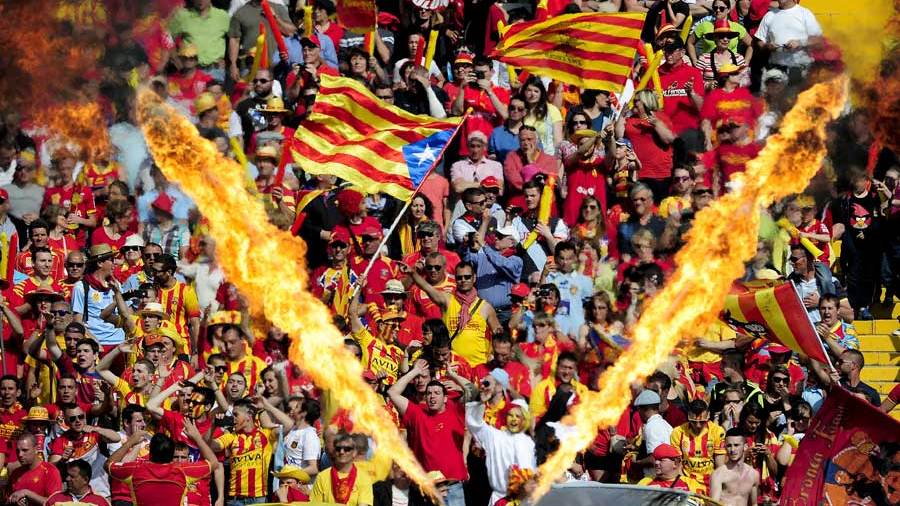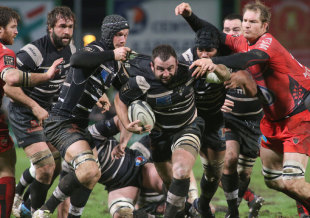|
Top 14
Changing of the Top 14 guard
Martin Gillingham
May 1, 2014

For al Perpignan's razzmatazz, they could be in the PROD2 next term © Getty Images
Enlarge
Seven of France's 10 most populous cities will be represented in next season's Top 14. Six years ago, that figure was just two. The times they are a-changin' in world rugby's most affluent domestic league. Back in the 2007-8 season half the clubs were on operating budgets of less than 10 million euros while just one, Toulouse, boasted a number in excess of 20 million. Next season, it is likely that all 14 will be into eight figures with just Bordeaux-Begles, Brive, Oyonnax and the Pro D2 play-off winner (whoever that is) not within spitting distance of 20 million. Toulouse, meanwhile, sailed over 30 million long ago. The emerging influence of France's big cities on club rugby is undeniable with just Lille, Nantes and Strasbourg of the most populous 10 not regular home venues for clubs. That said, Nantes hosted both Top 14 semi-finals last season (and has been used by Racing Metro as host city for two Heineken Cup matches) while Lille will be doing the same next month. Stade Francais also played their home fixture against Toulon last season in Lille. The urbanisation of the game traditionally associated with the parochial towns of the south-west is entirely logical. Canal Plus have had to dig deeper into their war chest to maintain their exclusive association with the Top 14 and they need to make it pay. The pay channel's new rights agreement, signed with the LNR in January, is worth 355 million euros over five years and is more than double the previous deal.
"Canal Plus are looking for the biggest audiences which are more likely to be found by screening Toulouse against Paris or Lyon versus Paris," says Simon Gillham, a British businessman awarded the OBE in 2010 for services to Franco-British relations and whose passion is rugby. He's the vice-president of Brive. Gillham says: "Over the next 10 years we're going to see the clubs from the big cities go from strength-to-strength. The cities offer the potential of bigger crowds, greater sponsorship and are attractive to television." The shift in the balance of French rugby power has already been illustrated this week with Lyon's 31-13 defeat of Tarbes on Saturday clinching the second city club their second Pro D2 title in four years. Last time, Lyon were relegated in their first season back in the Top 14 but this time they are taking no chances and have been one of the most active and powerful clubs in the transfer market. Wallaby centurion George Smith is the marquee signing and is set for his third spell in France having already played for Toulon and Stade Francais. Also on their way to Lyon are the Toulon pair prop Emmanuel Felsina and flanker Pierrick Gunther who was a member of Philippe Saint-Andre's France squad 18 months ago. Another new face is prop Hoani Tui from Exeter and France international back rower Julien Puricelli who is on his way from Bayonne along with New Zealand fly-half Stephen Brett. Former Racing Metro scrum-half Mathieu Loree has agreed a move from Grenoble. The fallout from this weekend's final round of league matches could also see one or two players heading for Lyon. The most talked of possibilities are Perpignan's James Hook and Racing No.8 Masi Matadigo. Matadigo has signed a pre-contract to join Perpignan who need a minor miracle to retain their Top 14 status. Should they lose by more than seven points at Clermont on Saturday they shall be relegated to Pro D2 along with Biarritz. If the success of clubs like Lyon and Bordeaux-Begles is an example of how the big cities are emerging then the likely loss of the winners of three of the last nine championships tells us all we need to know about the fate of traditional big beasts trapped in small provincial towns. And if it's Biarritz and Perpignan this weekend, who could it be in 12 months' time? Might it be Bayonne, that glorious Basque town with its passionate fan base, powerful traditions but dependency on one man (France's Mr Specsavers Alain Afflelou) to be the financial glue which holds it all together, which succumbs? Or how about reigning champions Castres, the epitome of a small French rugby town, but whose budgets have long been underwritten by the pharmaceutical firm which carries the name of the club's late owner Pierre Fabre? It's feasible that they may be the next to find themselves left behind in a tournament where budgets of 18, 19 or 20 million euros will soon be insufficient.

Brive are making the right noises in the Top 14
© Getty Images
Enlarge
As for Brive, there must be an element of relief that they won't be finishing in this season's top six or seven and, therefore, not faced with the responsibility of making a good fist of a Champions Cup campaign at the same time as ensuring a little stretches a long way in the Top 14. The new money from the television deal shall enable Brive to increase next season's budget from 11 to 12 million with the emphasis placed on astute management both on the field and off it. "That's a good way of putting it," Gillham says. "Looking ahead to next season we have retained all our playing staff apart from one. Julien Le Devedec wants to move closer to where he is from and is joining Bordeaux. "Part of our attraction is that we give game time to good quality players who might have been struggling for it elsewhere and who perhaps found someone in their way at their previous club. Someone like Arnaud Mignardi." As for the finances, Brive operate on a model that limits their exposure to a single major investor withdrawing their support after catching a cold in their own environment or having seen the team doing the same in theirs. "No sponsor represents more than six percent of our turnover," Gillham says. This time last year Brive were heading for the Pro D2 play-offs and a victory in the final against Pau in Bordeaux. It was the result that catapulted them into the Top 14. "When we got back it was late into the night and there were still 10,000 people waiting in the town square to greet us. On the Monday, it was down to business and wondering how we could manage the next season." Though Brive go into this weekend's round 26 knowing their top flight status is safe for another year they face another summer of meticulous planning to ensure they're not one of the two "yo-yo clubs" - as Gillham calls them - who are left at the bottom in May 2015. "There are two divisions in the Top 14," Gillham says. "The top six and then the rest who are looking to fill places 7 to 12 but not 13th or 14th." © ESPN Sports Media Ltd
| |||||||||||||||
Live Sports
Communication error please reload the page.
-
Football
-
Cricket
-
Rugby
-
- Days
- Hrs
- Mins
- Secs
F1 - Abu Dhabi GP
Abu Dhabi Grand Prix December 11-131. Max Verstappen ()
2. Valtteri Bottas (Mercedes)
3. Lewis Hamilton (Mercedes)
4. Alexander Albon ()
5. Lando Norris ()
6. Carlos Sainz Jr ()
-
ESPNOtherLive >>
Golf - Houston Open
Snooker - China Open
Tennis - Miami Open

